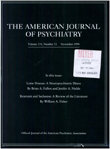Sensory gating deficits in schizophrenia: new results
Abstract
OBJECTIVE: It has been widely hypothesized that sensory gating failures and sensory overload occur in schizophrenic patients compared to normal subjects. The authors of this study sought to confirm and extend results of earlier studies that showed specific sensory gating deficits in schizophrenic patients. METHOD: Age- and sex-matched schizophrenic patients (N = 20) and normal subjects (N = 20) were tested using electrophysiologically recorded P50 event-related potentials to assess the overall competence of the subjects' central sensory inhibitory capacity by measuring sensory filtering or gating. P50 area responses to two 75-dB (conditioning and test) click stimuli of 0.04-msec duration, averaged over 60 trials, were recorded for each subject. Normally, the first (conditioning) click stimulus induces gating mechanisms that result in diminished or gated P50 event-related potentials in response to the second click stimulus. RESULTS: The schizophrenic subjects manifested a significant sensory gating deficit at frontal, central, and parietal electrode placement sites, with a nonsignificant tendency for the deficit to be most prominent in the frontal areas of the brain. CONCLUSIONS: These data reflect a regionally diffuse loss of normal sensory gating in schizophrenic patients.
Access content
To read the fulltext, please use one of the options below to sign in or purchase access.- Personal login
- Institutional Login
- Sign in via OpenAthens
- Register for access
-
Please login/register if you wish to pair your device and check access availability.
Not a subscriber?
PsychiatryOnline subscription options offer access to the DSM-5 library, books, journals, CME, and patient resources. This all-in-one virtual library provides psychiatrists and mental health professionals with key resources for diagnosis, treatment, research, and professional development.
Need more help? PsychiatryOnline Customer Service may be reached by emailing [email protected] or by calling 800-368-5777 (in the U.S.) or 703-907-7322 (outside the U.S.).



